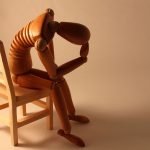Something Wicked: Anacardium for Serious Mental Illness
Tara Peyman, ND
Case 1:
The Perfect Fit
James was 17 years old when I started treating him in May of 2011. I diagnosed him as having schizoaffective disorder. He had previously been diagnosed with bipolar disorder, but he had hallucinations that persisted for weeks at a time without being in a depressive or manic episode, so schizoaffective disorder is a more accurate diagnosis. He was on lithium, quetiapine fumarate, bupropion hydrochloride, buspirone hydrochloride, topiramate for headaches, and a diet pill to help control his appetite, which was increased due to quetiapine. Despite all of these medications, James was still hallucinating and depressed when I took his case.
He started to have depressive symptoms as a young child and had begun taking antidepressants at age 8 years. He has been overweight since childhood and has a history of feeling criticized by his father, who would call him fat and make fun of him. He has been insecure from a young age. “Insecure is really not the right word actually,” he told me. “Insecurity means that you’re not quite sure of yourself. I’m sure of myself. I am sure that I don’t deserve to live. I feel disgusting and worthless, and I hate myself, and I don’t think that anyone could convince me otherwise.”
James felt socially isolated as a child and still does. At his first visit, he said:
I feel like I am disconnected from everyone. I don’t want to interact with anyone because I hate people. People…are mean. I don’t care if people don’t like me. If I’m mad, I try to say the meanest thing I can to the other person, to make them hurt in the most painful way possible. I know that’s not a good thing, but it’s like I don’t even have control over what I say when I’m mad. It’s like there’s some evil thing inside me whispering those mean thoughts, and I just have to say them to get them out of my head, or else I will want to hurt myself instead.
James had hallucinations almost every day, regardless of his mood. He would hear a voice that would speak to him in a twisted singsong tone, telling him to hurt himself or torture animals. He would think: “I’m ugly,” and the voice would say, “Make yourself beautiful. Cut yourself.” He would think, “I’m alone,” and the voice would say, “You’re alone because nobody wants to be with you.” It would tell him to bury his brother’s dog alive or cut his cat into pieces. He would punch the wall and scream for the voice to stop because he actually never wanted to do or think those things. He told me: “I feel separate from this voice, this evil man in my head. I know it’s not me. But sometimes I can’t quiet the voice, and it takes over.”
His memory was terrible. James could not remember what he was just about to do or say. He would forget the things that he had just done the day before. This made him feel even more worthless and incapable of achieving things. His headaches were in his forehead and occiput, with a tense feeling of constriction in the back of his head and neck. The pain in his forehead was a tight sensation, which was momentarily better from holding pressure on his forehead with his hand.
Based on his description of these symptoms, I prescribed Anacardium orientale 6C (2 pills once daily). The malicious voice in his head stopped in the first week of taking this remedy. I asked him about his self-worth. He said: “I didn’t really realize it until you just asked, but I haven’t been thinking hateful thoughts about myself all week. Don’t get me wrong; I don’t feel all lovey, but I don’t feel like I want to die anymore.” That is progress.
A few months later, on the same potency of Anacardium, James was actually being nice to people. He was helping his brother with his homework and doing dishes after dinner for his mom without being asked. We increased the potency any time he started to have a lag in progress. Self-confidence and overall outlook improved. His forgetfulness and headaches were reduced. We worked with his psychiatrist to taper his medications over about 6 months as his mood improved.
Now, James is off all pharmaceutical drugs and is only taking a homeopathic remedy, a multivitamin, and 2000 mg of fish oil. Hallucinations have never returned, and it has been over a year since he has been off antipsychotic medications. This homeopathic remedy was such a perfect fit for his case that it was able to help him not only taper off 4 psychiatric drugs but also keep him in remission from schizoaffective disorder. The last time I asked how he was feeling, he said: “I feel pretty good about myself now. I don’t really have anything to complain about anymore.”
Case 2:
A Dark Passenger
I started Julia’s case with Aurum metallicum for suicidal depression. She was 20 years old, was in college for theater and dance, and had a quiet, kind, and shy disposition. She had a history of mild, brief hypomanic episodes, alternating with deep depressive episodes, so I diagnosed her with bipolar II. In our initial consultation, Julia was deeply depressed and felt worthless. She would berate herself with harsh criticism and felt guilty very easily. She told me of her thoughts to jump from the top of her dormitory the previous week, after finding out that the man she was interested in was dating another woman. The only things that made her feel better were playing music and thinking of dying. I started her on Aurum 6C right away, and she responded very well. Suicidal thoughts diminished in a day and then disappeared over a few weeks. Confidence improved. A few potencies of Aurum were given over several months, with positive results. Then things took a new turn in the winter of that year.
Julia called me to report that she had come home from college because she was not able to function. The thoughts of self-reproach came back, but instead of clearly being her own thoughts, they seemed to come from outside of her head. She was experiencing rapidly shifting moods, within about 30 minutes, from extreme despair with weeping to racing thoughts and spontaneous laughter. She had started muttering to herself and told me that she was not quite sure if she was awake or dreaming. She began cutting herself. She started to feel very suspicious that other students at school were talking about her, laughing at her, and plotting against her. She felt afraid to be alone. She could not sleep more than a few hours per night. I decided to give her Hyoscyamus, and I considered Stramonium, Kali bromatum, and Zincum metallicum as well. Julia responded to Hyoscyamus within a few hours of starting it, and her mood stabilized progressively.
In a case of bipolar disorder in a teen or young adult, sometimes what you see in the beginning is not the entirety of the case. Things can actually develop further, and the full depth of the illness can start to arise. It does not necessarily mean that Aurum was the wrong remedy at first; in fact, it may have saved her life. This more severe presentation of bipolar disorder simply had not shown up yet because of her younger age at first presentation. What I thought was bipolar II now was in fact bipolar I, and she was in a mixed episode with psychotic symptoms. If I had given Hyoscyamus first, could it have prevented these symptoms from arising? Hyoscyamus was not the indicated medicine at the time, so it may not have helped prevent suicide like Aurum did. I have decided that speculating about these things may be more harmful than helpful. I always bring my focus back to the facts of what remedy appears to be homeopathic to the case at the time.
Julia continued Hyoscyamus for about 8 months, going from a 6C to a 10M potency over time, with improvements in mood stability. Then once again, new symptoms appeared. I was following up on Hyoscyamus 10M, and she told me that she was not suicidal but she was depressed. She was irritable and averse to company. She said: “My usual self-destructive thoughts have turned more external, and I feel this expectation that things are going to go wrong. I actually kind of want things to go wrong, to get destroyed or messed up. I feel apprehensive and really negative. I feel disconnected from things, from people. I feel like I’m separated from everyone else and that I can’t connect with anyone mentally or emotionally.”
I went through her list of other previous symptoms, and she said that there was nothing else bothering her. I felt like she was holding something back. I asked her: “What else did you want to talk about today?” She inhaled quietly and then spoke:
Well, I wasn’t going to tell you this because it’s really weird, but I feel like maybe it’s important. I feel like…there is another part of me. There is someone else inside my head. She is not always there. When she comes back, I can’t talk; I can’t do anything. She is harsh and says really mean things. She doesn’t care about people. I feel like, when she’s here, she wants to completely take over me. She tells me to say things: like when I was upset last night, she told me to tell my boyfriend that it was his fault that I’m depressed. When she was in my head, I didn’t care that I made him sad by saying those things. When she’s there, I feel like there is someone breathing down my neck. I can tell her to go away, but she just tells me that she will come back.
Julia had a delusion of being possessed with a cruel, unfeeling entity that was “breathing down” her neck. She also had a delusion of being separated from the world. These delusions of possession and of being separated from others, as well as the totality of symptoms in Julia’s case, were covered well by Anacardium. I gave her Anacardium orientale 6C and checked in after a few days. She was hypersensitive to Anacardium, and she had a therapeutic aggravation of depression and anger. She stopped the remedy, and things improved. Then her mood lightened, the delusion of possession went away, and she felt calm, centered, and more connected with her family and friends. She took single doses of Anacardium 6C about once per month. She restarted her studies at college. At her most recent follow-up visit, she told me: “I feel pretty good. I feel like my life is moving in a good direction.”
Homeopathy—Fast and Effective
Until I had seen it for myself, if others told me that homeopathic medicine could be more effective and faster acting than a heavy regimen of psychiatric drugs in cases like these, I would not have believed them. I would not have thought that a patient who experienced severe mixed episodes or felt that he or she was possessed with an evil entity could be stable, healthy, and happy with a few $8 over-the-counter homeopathic remedies. I am so grateful to know that, with such a simple therapeutic intervention, patients like James, Julia, and others with severe mental illness can shift from a place of suffering to a place of peace and happiness.

Dr Tara Peyman, ND
Tara Peyman, ND is a licensed naturopathic physician with a focus in the homeopathic and integrative treatment of bipolar disorder and mental illness. She practices at Arizona Natural Health Center in the Phoenix area. Visit www.AZNaturalHealth.com for more information.










